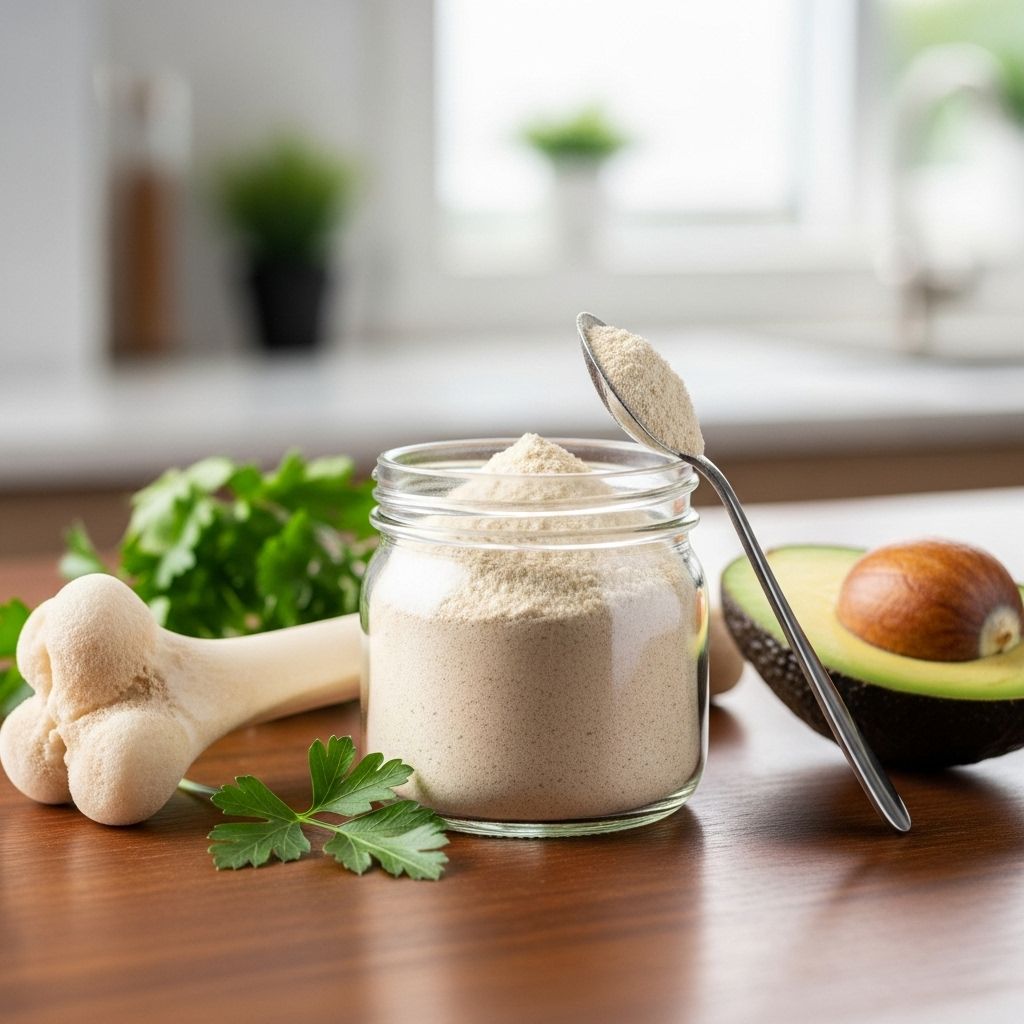Bovine Collagen: Benefits, Dosage, Side Effects & Expert Insights
Discover the science-backed benefits, optimal dosage, and potential side effects of bovine collagen supplements.

Table of Contents
What is Bovine Collagen?
Bovine collagen is a protein supplement derived primarily from the hides, bones, and connective tissues of cows. It is one of the most common types of collagen used in dietary supplements, cosmetics, and food additives. As your body’s supply of natural collagen declines with age, supplementation with bovine collagen is thought to support the health of skin, joints, bones, and more.
Health Benefits of Bovine Collagen
Skin Health and Aging
Collagen serves as a major building block for skin, supporting its structure, elasticity, and hydration. As people age, collagen production dwindles, leading to wrinkles, sagging, and dryness. Research in animal studies suggests that bovine collagen peptides can improve skin laxity, repair collagen fibers, and increase the skin’s collagen content. However, effects on skin moisture appear limited. Some evidence points to improved antioxidant activity in the skin, which may further combat signs of aging.
Joint and Bone Health
Bovine collagen is often marketed for joint pain and arthritis relief, especially osteoarthritis. Small-scale human studies have found that daily bovine collagen supplementation may reduce pain and improve joint function in people with osteoarthritis. Animal research also indicates potential for bovine collagen to help prevent bone loss, suggesting it might play a role in osteoporosis prevention.
Other Potential Benefits
Some studies hint at additional benefits, such as supporting gut health and promoting muscle recovery, but these areas require further scientific validation.
Recommended Dosage
The optimal dosage of bovine collagen depends on the intended health benefit, individual needs, and product type. Studies have used a range of doses:
- Osteoarthritis: Clinical trials have used around 10 grams per day (divided into two doses).
- Skin Health: Animal studies often use doses in the range of 200–800 mg/kg body weight, but human equivalent doses are less established.
Most over-the-counter bovine collagen supplements recommend a daily dose of 2.5–10 grams. Always follow the manufacturer’s instructions and consult a healthcare provider before starting any new supplement regimen.
Forms and Types of Bovine Collagen
Common Forms
- Powder: Easily mixed into drinks and foods.
- Capsules/Tablets: Convenient dosing.
- Food Products: Found in broths, bone broths, and fortified foods.
Types Based on Source
Most bovine collagen is extracted from the skin, bones, or tendons of cows. There are also differences based on production method; for example, peptides prepared by enzymatic hydrolysis (like Alcalase) may have superior effects on skin quality compared to those prepared by other enzymes.
Side Effects & Safety Concerns
Possible Adverse Effects
Collagen supplements, including bovine collagen, are generally considered safe for most healthy adults. Reported side effects are rare but may include:
- Mild digestive upset
- Allergic reactions (especially in those allergic to beef or bovine products)
- Unpleasant taste or aftertaste
Special Considerations
People with allergies to beef, vegetarians, and vegans should avoid bovine collagen supplements. Those with autoimmune conditions or high risk for foodborne illness should consult a healthcare provider before use.
There is currently no strong evidence that bovine collagen has long-term negative effects, but as with any supplement, moderation is key.
Frequently Asked Questions
Q: How long does it take to see results from bovine collagen supplements?
A: Effects on skin and joint health may become noticeable after several weeks to months of consistent use, but individual responses vary.
Q: Is bovine collagen better than marine or plant-based collagen?
A: Each type has unique benefits. Bovine collagen is particularly rich in types I and III collagen, supporting skin, bones, and joints. Marine collagen (from fish) is high in type I and may be better for skin. Plant-based collagen boosters (not true collagen) contain nutrients like vitamin C that support the body’s collagen production. The best choice depends on your dietary preferences and health goals.
Q: Can bovine collagen interact with medications?
A: There are no widely reported drug interactions, but always discuss supplements with your healthcare provider if you are taking prescription medications.
Q: Who should avoid bovine collagen supplements?
A: People with beef allergies, vegetarians, vegans, and those with autoimmune conditions should avoid bovine collagen or consult a healthcare provider before using it.
Summary and Takeaway
Bovine collagen is a widely used source of collagen peptides that may support skin elasticity, joint health, and bone density. While promising, the current evidence is strongest for minor improvements in osteoarthritis symptoms and skin laxity, and more human studies are needed to confirm other benefits. Dosage typically ranges from 2.5–10 grams per day, depending on the product and intended use. Side effects are uncommon but possible, particularly in those with beef allergies or dietary restrictions.
As with any supplement, consult your healthcare provider before starting bovine collagen, especially if you have underlying health conditions or dietary concerns.
“Bovine collagen supplements may help counter the effects of lower collagen levels, but more human research is needed on all of these potential benefits.”
References
- https://www.healthline.com/nutrition/bovine-collagen
- https://pmc.ncbi.nlm.nih.gov/articles/PMC5707681/
- https://pmc.ncbi.nlm.nih.gov/articles/PMC8620403/
- https://my.clevelandclinic.org/health/articles/23089-collagen
- https://www.uclahealth.org/news/article/should-you-take-collagen-supplements
- https://nutritionsource.hsph.harvard.edu/collagen/
- https://www.hackensackmeridianhealth.org/en/healthu/2025/02/04/the-science-behind-collagen-powder-does-it-work
Read full bio of medha deb












